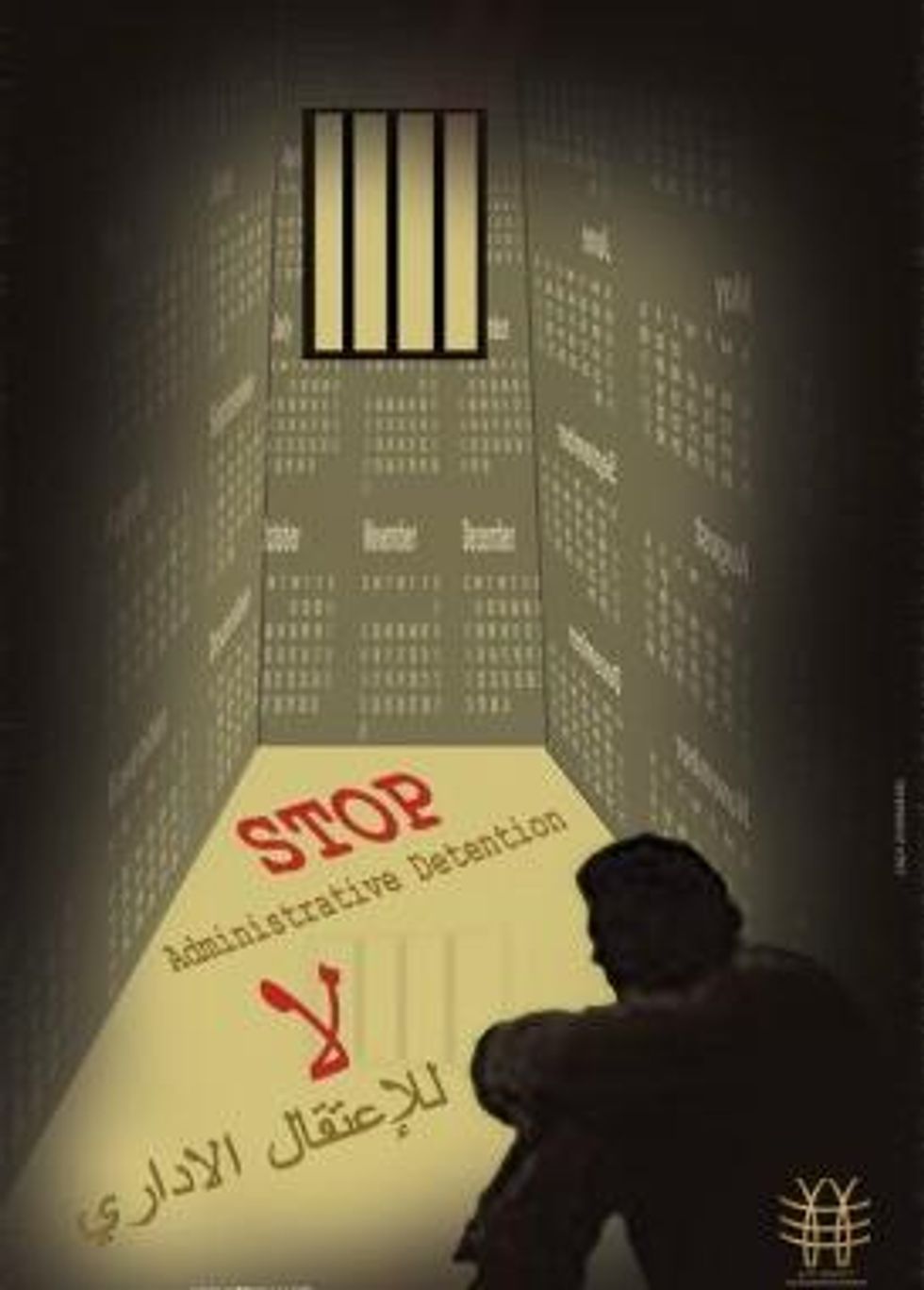Netanyahu Looks to Gitmo to Justify Force-Feeding of Palestinian Hunger Strikers
Hunger strike against detentions without charge or trial passes day 40
Israeli Prime Minister Benjamin Netanyahu is aggressively pushing a bill that would green-light the force-feeding of Palestinian prisoners on hunger strike, citing the U.S. military's routine use of this practice against detainees at the Guantanamo Bay

Netanyahu told the security cabinet on Sunday to move more quickly on discussions of the bill, Haaretz reports.
The Israel National Bioethics Council and Israeli Medical Association are vocally opposing the law, and the IMA vowed on Thursday to prohibit Israeli physicians from participating in force-feeding, which it likened to torture, according to reporting by Israel's Channel 2 News.
In response, Netanyahu declared that he would find doctors willing to carry out the controversial practice and mentioned the U.S.'s routine practice of force-feeding hunger striking Guantanamo Bay inmates.
Force-feeding at Guantanamo Bay has been condemned as torture and a violation of international law by the United Nations human rights office. The painful insertion of tubes and pumping of food, as well as threat of stomach damage and asphyxiation, has been compared to water-boarding.
According to statement from supporters, at least 125 Palestinians detained in Israeli prisons have been on hunger strike since April 24 to protest Israel's "administrative detentions," in which the nation holds people without charge or trial on "evidence" that is kept secret from the prisoner and lawyers. Critics charge that these detentions, which can be renewed indefinitely, are used as a tool of collective punishment of Palestinians.
Hunger strikers were mass hospitalized last week, and as Common Dreams previously reported. According to a letter to U.S. Congress released Tuesday by family members, they are also facing retaliation from prison authorities, including "strip searches; solitary confinement; beating, insults and humiliation during daily cell raids; denial of visits from their families; and restricted access to their legal counsel."
On Sunday, a coalition of human rights organizations released an open letter to the EU Foreign Policy Chief Catherine Ashton calling for "urgent intervention" on behalf of the hunger striking prisoners.
_____________________
An Urgent Message From Our Co-Founder
Dear Common Dreams reader, The U.S. is on a fast track to authoritarianism like nothing I've ever seen. Meanwhile, corporate news outlets are utterly capitulating to Trump, twisting their coverage to avoid drawing his ire while lining up to stuff cash in his pockets. That's why I believe that Common Dreams is doing the best and most consequential reporting that we've ever done. Our small but mighty team is a progressive reporting powerhouse, covering the news every day that the corporate media never will. Our mission has always been simple: To inform. To inspire. And to ignite change for the common good. Now here's the key piece that I want all our readers to understand: None of this would be possible without your financial support. That's not just some fundraising cliche. It's the absolute and literal truth. We don't accept corporate advertising and never will. We don't have a paywall because we don't think people should be blocked from critical news based on their ability to pay. Everything we do is funded by the donations of readers like you. Will you donate now to help power the nonprofit, independent reporting of Common Dreams? Thank you for being a vital member of our community. Together, we can keep independent journalism alive when it’s needed most. - Craig Brown, Co-founder |
Israeli Prime Minister Benjamin Netanyahu is aggressively pushing a bill that would green-light the force-feeding of Palestinian prisoners on hunger strike, citing the U.S. military's routine use of this practice against detainees at the Guantanamo Bay

Netanyahu told the security cabinet on Sunday to move more quickly on discussions of the bill, Haaretz reports.
The Israel National Bioethics Council and Israeli Medical Association are vocally opposing the law, and the IMA vowed on Thursday to prohibit Israeli physicians from participating in force-feeding, which it likened to torture, according to reporting by Israel's Channel 2 News.
In response, Netanyahu declared that he would find doctors willing to carry out the controversial practice and mentioned the U.S.'s routine practice of force-feeding hunger striking Guantanamo Bay inmates.
Force-feeding at Guantanamo Bay has been condemned as torture and a violation of international law by the United Nations human rights office. The painful insertion of tubes and pumping of food, as well as threat of stomach damage and asphyxiation, has been compared to water-boarding.
According to statement from supporters, at least 125 Palestinians detained in Israeli prisons have been on hunger strike since April 24 to protest Israel's "administrative detentions," in which the nation holds people without charge or trial on "evidence" that is kept secret from the prisoner and lawyers. Critics charge that these detentions, which can be renewed indefinitely, are used as a tool of collective punishment of Palestinians.
Hunger strikers were mass hospitalized last week, and as Common Dreams previously reported. According to a letter to U.S. Congress released Tuesday by family members, they are also facing retaliation from prison authorities, including "strip searches; solitary confinement; beating, insults and humiliation during daily cell raids; denial of visits from their families; and restricted access to their legal counsel."
On Sunday, a coalition of human rights organizations released an open letter to the EU Foreign Policy Chief Catherine Ashton calling for "urgent intervention" on behalf of the hunger striking prisoners.
_____________________
Israeli Prime Minister Benjamin Netanyahu is aggressively pushing a bill that would green-light the force-feeding of Palestinian prisoners on hunger strike, citing the U.S. military's routine use of this practice against detainees at the Guantanamo Bay

Netanyahu told the security cabinet on Sunday to move more quickly on discussions of the bill, Haaretz reports.
The Israel National Bioethics Council and Israeli Medical Association are vocally opposing the law, and the IMA vowed on Thursday to prohibit Israeli physicians from participating in force-feeding, which it likened to torture, according to reporting by Israel's Channel 2 News.
In response, Netanyahu declared that he would find doctors willing to carry out the controversial practice and mentioned the U.S.'s routine practice of force-feeding hunger striking Guantanamo Bay inmates.
Force-feeding at Guantanamo Bay has been condemned as torture and a violation of international law by the United Nations human rights office. The painful insertion of tubes and pumping of food, as well as threat of stomach damage and asphyxiation, has been compared to water-boarding.
According to statement from supporters, at least 125 Palestinians detained in Israeli prisons have been on hunger strike since April 24 to protest Israel's "administrative detentions," in which the nation holds people without charge or trial on "evidence" that is kept secret from the prisoner and lawyers. Critics charge that these detentions, which can be renewed indefinitely, are used as a tool of collective punishment of Palestinians.
Hunger strikers were mass hospitalized last week, and as Common Dreams previously reported. According to a letter to U.S. Congress released Tuesday by family members, they are also facing retaliation from prison authorities, including "strip searches; solitary confinement; beating, insults and humiliation during daily cell raids; denial of visits from their families; and restricted access to their legal counsel."
On Sunday, a coalition of human rights organizations released an open letter to the EU Foreign Policy Chief Catherine Ashton calling for "urgent intervention" on behalf of the hunger striking prisoners.
_____________________

